News flash! There’s a lot going on to improve the Worcester food system in terms of accessibility, sustainability and just plain versatility. When you live in a city, it’s easy to take for granted all the exciting things happening there. It’s even more common for people to not even be aware of all wonderful things to know, see, and do. That’s especially true when those happenings and opportunities relate to a seemingly esoteric area like food policy and the food system. As Thanksgiving Week gets underway, we thought we’d highlight some of the things we’re thankful for here in the Worcester food system.
The Worcester Regional Food Hub
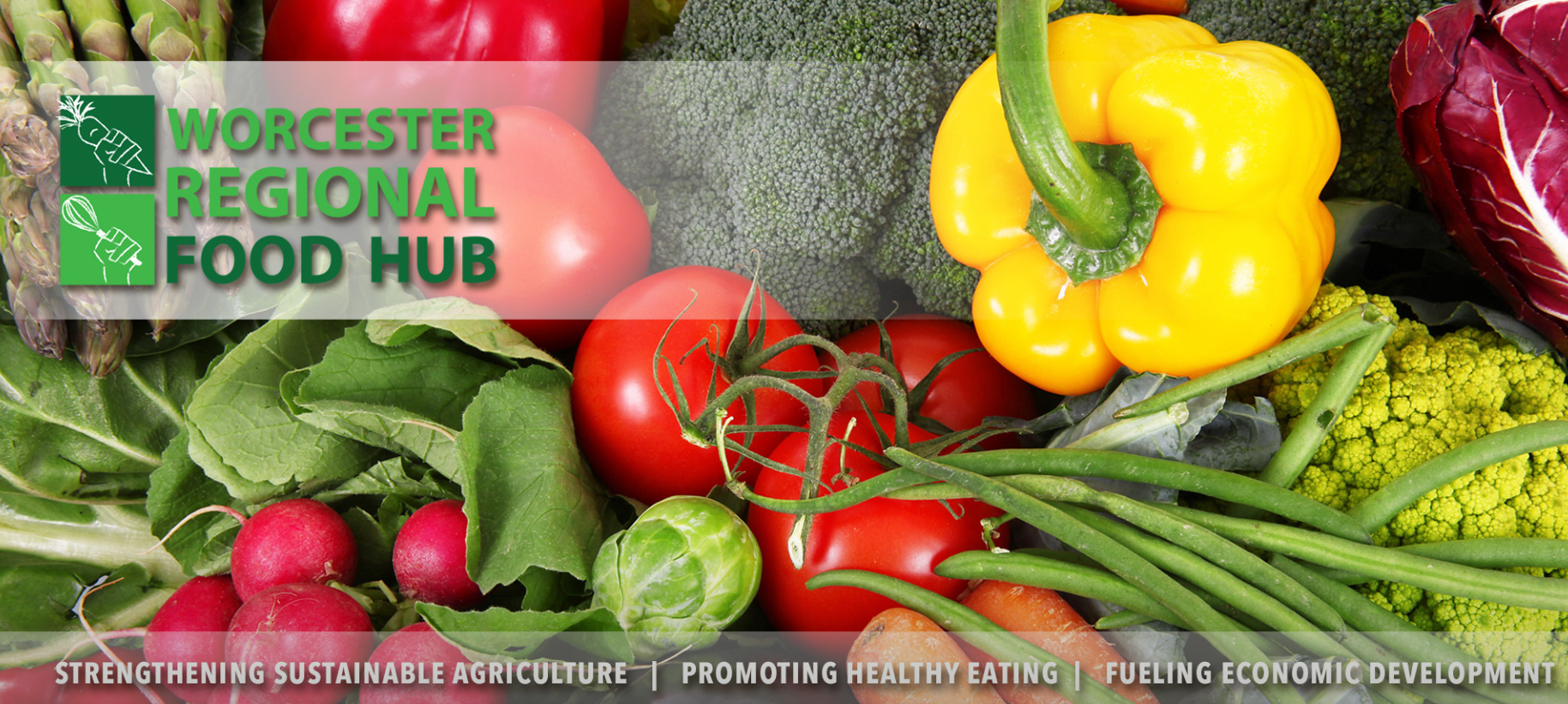
Started as a pilot program in 2016, the Regional Food Hub is now in its second year of operation. The collaboration between the Regional Environmental Council (REC) and the Regional Chamber of Commerce, with funding provided by The Health Foundation of Central Mass, the Food Hub works with local producers, suppliers, and entrepreneurs to bridge the gaps and make connections between multiple parts of the regional Worcester food system. Located at the Worcester County Food Bank, the Food Hub includes two distinct programs: the Commercial Incubator Kitchen and The Hub for Aggregation, Marketing, and Distribution.
Farmers Markets
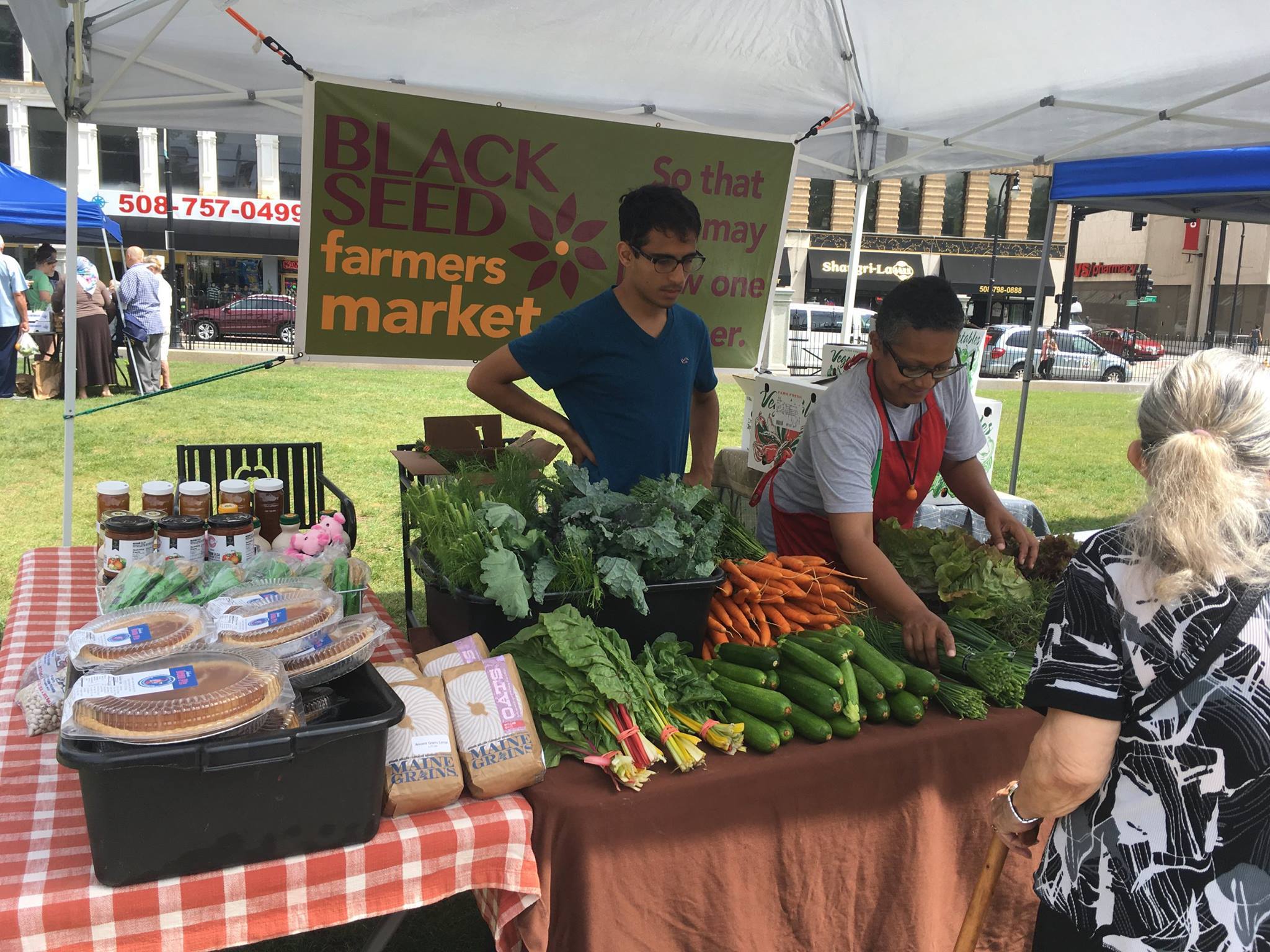
(Photo Credit: Black Seed Farmers Market)
Worcester boasts nearly an embarrassment of riches when it comes to farmers markets. In addition to the REC Community Farmers Markets and REC’s Mobile Farmers Market (including the Winter Mobile Farmers Market), we’re also home to the Black Seed Farmers Market and the Canal District Farmers Market. Between the various organizations, Worcester residents can visit a farmers market for fresh locally produced food every day of the week during the spring, summer and autumn, as well as year-round at the Canal District Farmers Market and the REC Winter Mobile Farmers Market on specific days.
Community Gardens
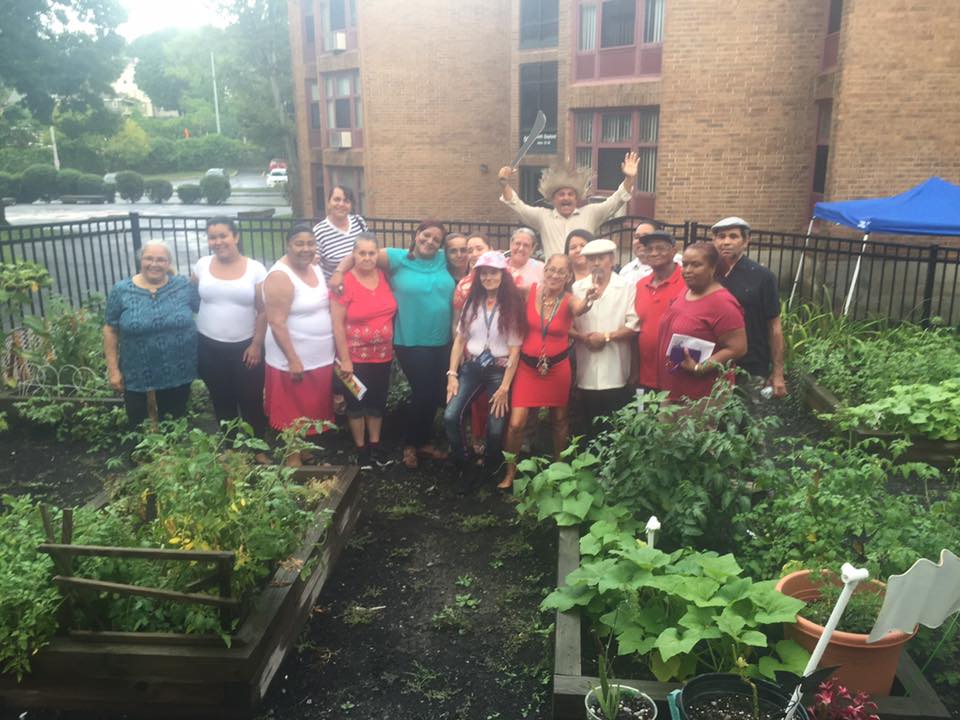
So very many community gardens! At last count, Worcester hosts nearly 75 community gardens, including gardens hosted at public schools, housing developments, and in neighborhoods throughout the city. They include the Castle Street Community Garden, REC’s UGROW gardens, school gardens and YouthGROW gardens, and more.
Backyard Gardens
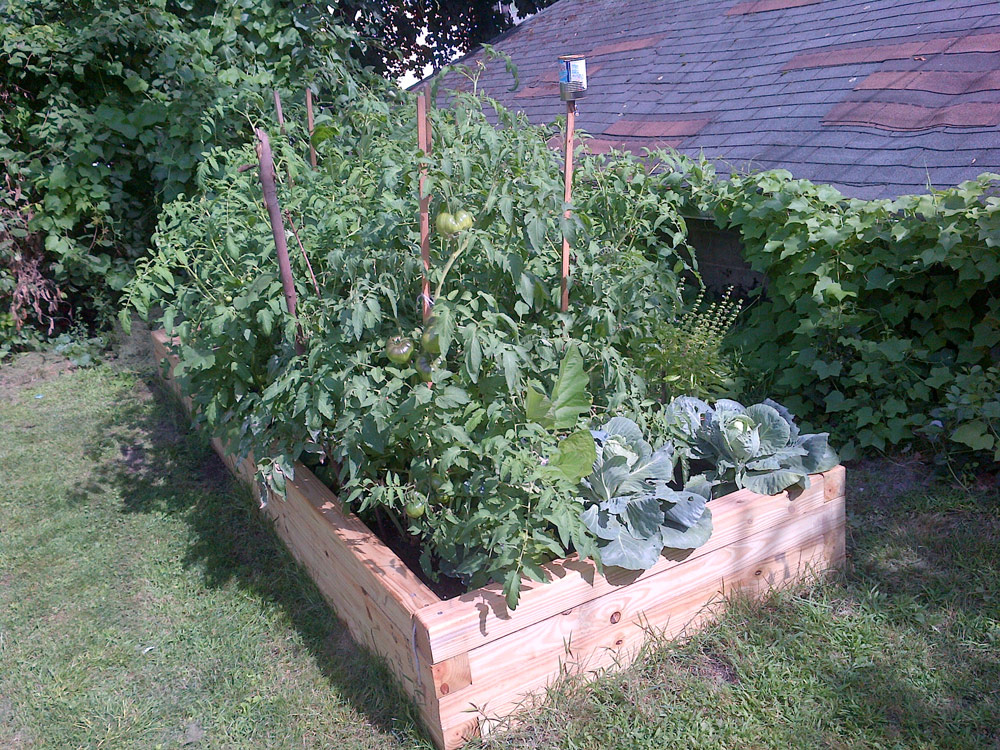
Begun as a collaborative project between UMass Memorial Health Care and REC, with assist from the Worcester Carpenters Union, the Bell Hill Backyard Gardens project helped families in the Bell Hill area grow healthy, fresh food for themselves and their neighbors. This type of collaboration is one of the things that helps put Worcester in the front lines of making healthy food accessible to all residents.
Universal School Breakfast and Lunch

That’s right – all public school students in Worcester can eat breakfast and lunch for free at school, thanks to the city’s participation in the federal Food Nutrition Service’s Community Eligibility Provision. Making school breakfast and lunch free for all students has benefits that go beyond filling empty bellies – a pilot study of students receiving free lunches in the UK found that all students made academic gains, and smaller anecdotal examples find that behavioral issues drop when children are well-fed.
Urban Farming
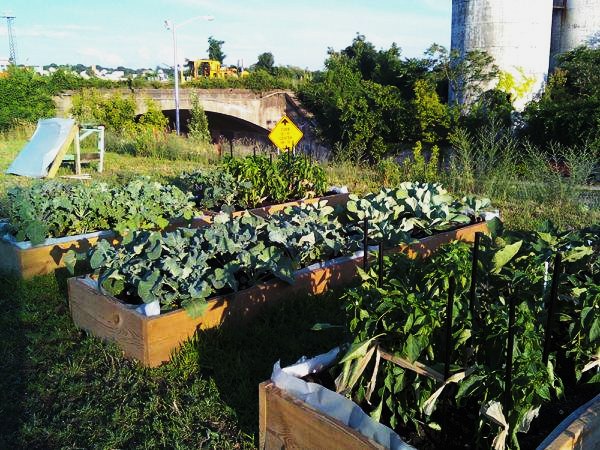
Worcester is uniquely positioned to benefit from increasing access to urban farming. That’s one of the reasons that we’ve been anxiously shepherding a new zoning ordinance through the Worcester’s zoning process. We’ve made considerable progress on this front, but the rezoning still needs to jump a couple of hurdles. When it passes, it will allow families, businesses, and individuals in Worcester to farm on their own land and sell the produce from onsite farm stands, greatly increasing both access to healthy, locally grown food and economic opportunities for Worcester residents.
Engaged Political Representatives
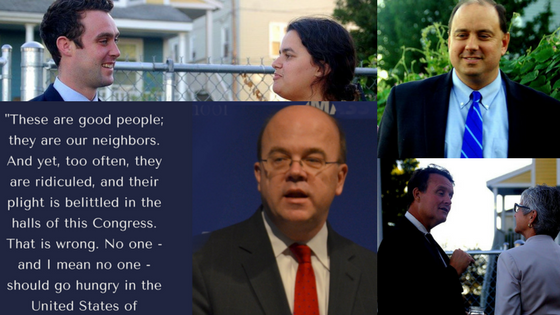
Worcester is also blessed with food policy champions in government at all levels. They include Congressional Rep. Jim McGovern and State Senators Jamie Eldridge, Dan Donahue, and Mike Moore. Worcester Mayor Joe Petty and City Manager Ed Augustus, as well as many of our City Councilors have stepped up to work with us on food security and access issues, especially the Urban Agriculture ordinance currently in committee.
Local Colleges and Universities
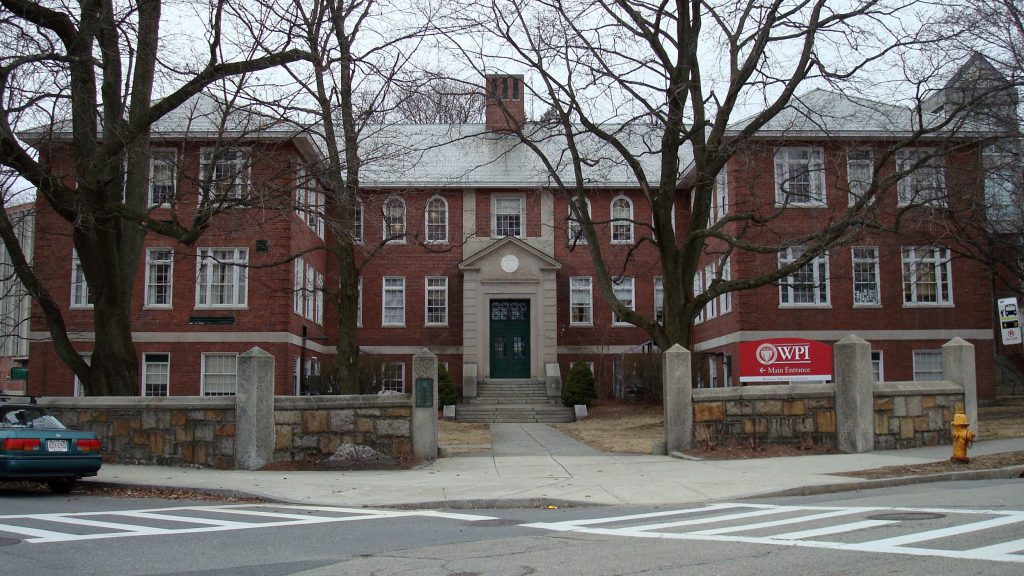
Worcester’s higher education community is one of our biggest assets when it comes to creating a just and sustainable Worcester food system. From Worcester State University’s Urban Action Institute, to WPI’s research and logistics assistance – most recently with the new Worcester Bioshelter in partnership with Worcester Common Ground – to the many, many community partnerships and volunteer organizations at UMass Medical Center, UMass Memorial, Clark University, Quinsigamond College, Holy Cross College and Assumption College, Worcester benefits from its academic community in so many ways. It’s especially exciting to watch as they connect with local producers and suppliers to feed their students and staff.
Worcester County Food Bank
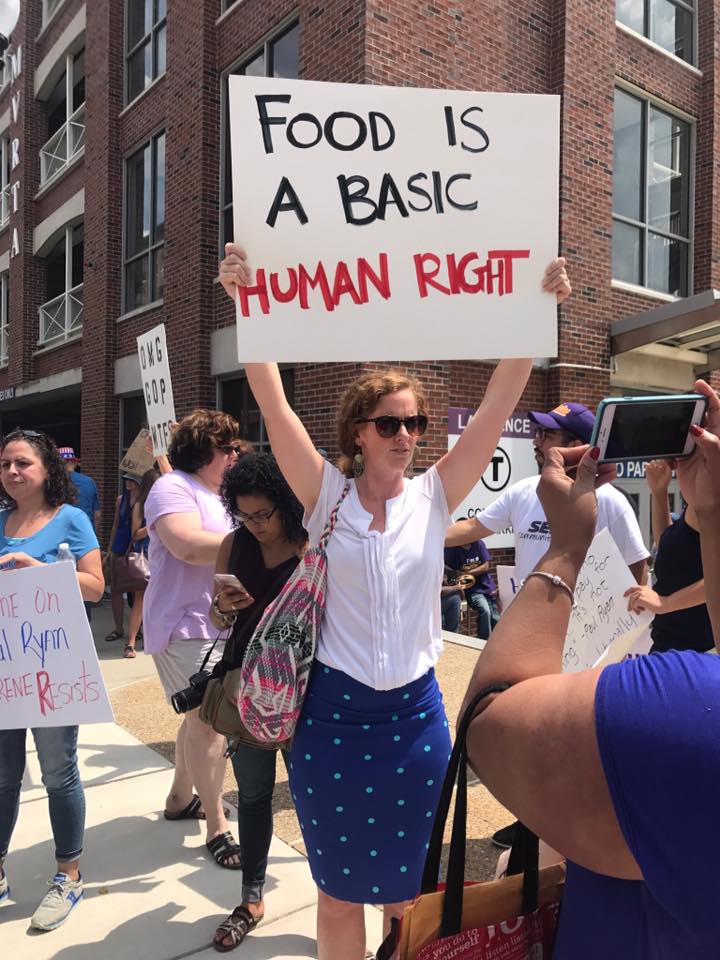
Full disclosure: The Worcester Food Policy Council is a project of the Worcester County Food Bank, but that’s not the only reason we’re thankful to have this incredible resource as part of our community. In addition to leveraging the power of scale to help support many of our local food banks, soup kitchens, shelters and food pantries, WCFB has been and continues to be a bold leader in advocating for just food policy, and its many interconnected issues. Its mission doesn’t end with filling people’s plates. Instead, the Food Bank takes its fight for food justice, food security, and food accessibility to State House, the national Capitol, and, when necessary, to the streets. Conversation with anti-hunger advocates from other parts of the country have underscored how rare and wonderful it is to have a regional food bank with a board of directors so open to engaging the fight for food justice on all fronts.
The Community
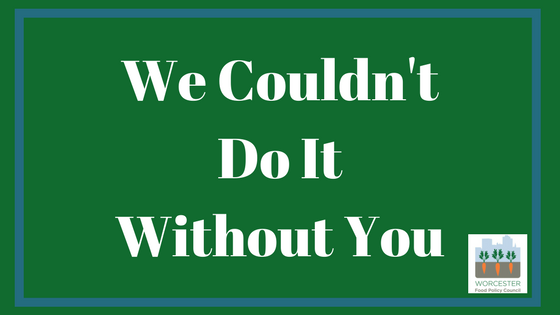
We saved the best for last. The community – that’s you, too – is what makes all of these good things happen. Every time we put out the call for help, you’re there – making phone calls, sharing information, emailing your representatives. You step up to volunteer for food drives, grow food, stop by food pantries to sort and stock shelves, cook at shelters and food kitchens, donate generously of your time, attention, goods, and money. Because of you, this city is on the way to a sustainable, just, and accessible Worcester food system. And for that, we are very thankful, each and every day.
